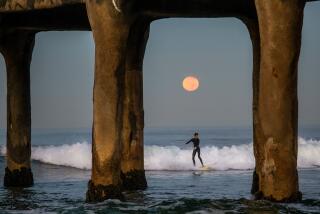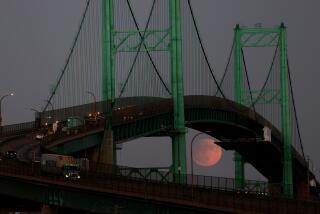The Woman in the Moon : Culture: Harvest Moon Festival is similar to Thanksgiving for people of East Asian ancestry. Because legend says that a goddess rules the lunar kingdom, it is also a ladies’ day event.
- Share via
You probably know him as the man in the moon, but Munson Kwok suggests you take another peek. The smiling lunar face is actually a woman, he insists. And if you look even harder, you should find a rabbit and a toad too.
Kwok was among several thousand self-professed moon enthusiasts who crowded into Chinatown on Saturday to celebrate Harvest Moon, sometimes described as the equivalent of Thanksgiving Day for more than 1.2 billion people of East Asian ancestry worldwide.
Falling on the 15th day of the eighth month in the Asian lunar year--in September or October by the Western calendar--the holiday is a time for families to come together, for farmers to celebrate a successful harvest and for everyone to count their blessings and honor the dead.
Chinese call the celebration the Harvest Moon, Mid-Autumn or Lantern Festival; Japanese refer to it as Obon, and Koreans know it as Chusok. Key to the holiday is the positioning of the moon: It must be at its farthest point from the earth, making it appear perfectly round and brilliant.
“It was beautiful last night!” said Miss Chinatown, Ada Tai, one of four women who were scheduled Saturday night to perform special moon-watching ceremonies based on rituals steeped in thousands of years of tradition and mythology. Two traveling telescopes, courtesy of the Griffith Observatory, were on hand to help adapt the ancient custom to modern Los Angeles.
For Kwok, an engineer who grew up in San Francisco’s Chinatown, years of moon-watching have laid to rest any dispute over the gender of the lunar body. Customs and folklore vary from country to country, but the most popular Chinese legend clearly regards the goddess Chang O as the moon’s most esteemed inhabitant.
Chang O, the story goes, fled to the moon after eating the herb of immortality, which had been given to her archer husband after he saved the earth by shooting down nine of its 10 scorching suns. Although the myths diverge at this point, the goddess is said to have governed the lunar kingdom ever since, while her husband, Hou-I, has ruled the solar realm.
“That is why it is a ladies festival,” said Kwok, a board member of the Chinese Cultural and Community Center of the Greater Los Angeles. “Men are not involved.”
Although the actual moon-watching preparations were reserved for women, the daylong Chinatown celebration included both male and female acts. In keeping with this year’s festival theme, “The Sound of Harmony,” dancers and musicians were invited from Asian, African-American and Latino communities throughout Southern California.
“Instead of the ugliness of L.A., we want to focus on the beauty of L.A.,” said Diane Poon, the festival’s chairwoman. “We wanted to bring all these ethnic cultures together to Chinatown to introduce them to what Chinatown is all about and introduce the people in Chinatown to all these other groups.”
Nelisha Walker, a performer with an African-American dance group, said the festival was an eye-opener. She watched in disbelief as half a dozen Chinese-American musicians pounded on drums in a crowded plaza near Hill Street.
“I didn’t know they played drums,” she said. “I know something new about their culture now. It has been a real good chance to be in tune to other cultures, (considering) all of the negative things we see around us.”
At the festival’s main plaza on Broadway, the Castelar Elementary School Lion Dance Group opened the celebration with a traditional Chinese step. Half a dozen boys draped themselves in a brightly colored lion’s costume, which the school recently purchased in Hong Kong. William Lee, 12, manned the head, while Daniel Vinh, 12, carried the tail.
“You have to follow where his leg is going,” Daniel said. “That’s the only trick.”
The two boys said they spent Friday night--when the Harvest Moon officially fell this year--staring at the heavenly body. Daniel confessed, however, that he went outside mostly because it was too hot inside, not for tradition’s sake. He was uncertain about the origins of the Moon Festival but said the most important part of it was eating moon cake.
The small cakes come with an assortment of fillings, including sweetened black beans and lotus seeds. The cakes were to be served with tea Saturday night during the official Chinatown moon-watching ceremonies, but the most dedicated moon enthusiasts said they had already eaten them on Friday night.
At one Chinatown bakery, Roger Hong was among a throng of festival-goers who bypassed a tray of the Harvest Moon Festival specialty and ordered something else. “They are very rich,” he warned. “If you eat one of those, you will need a lot of hot tea to digest it.”


